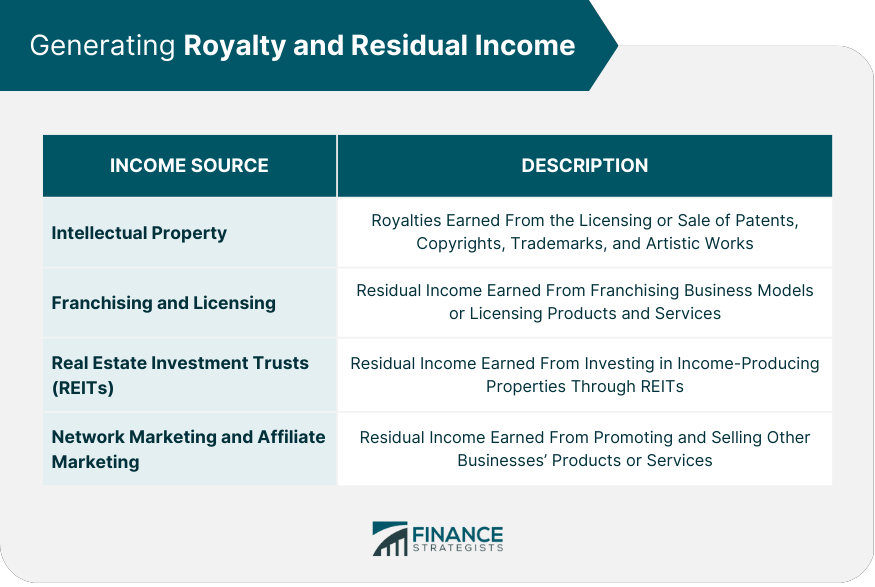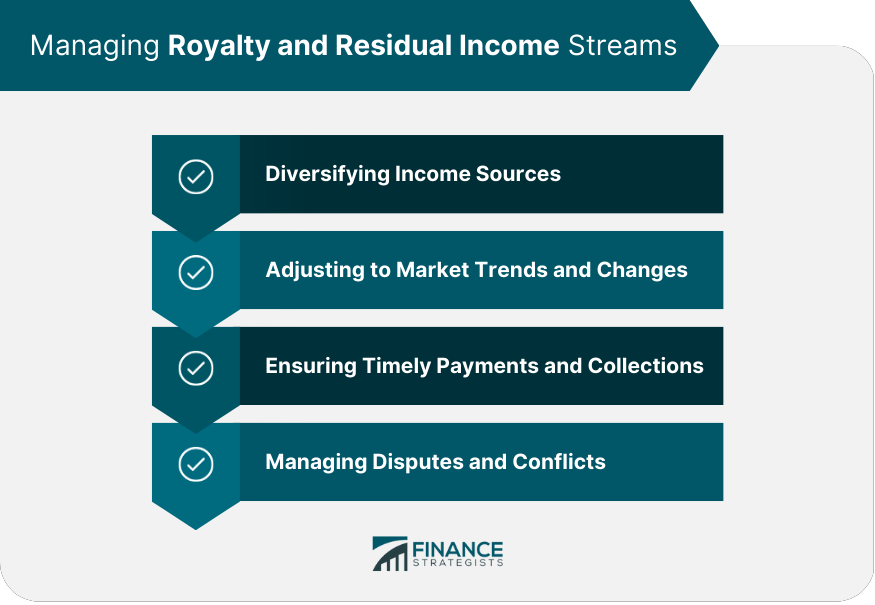Effective royalty and residual income management are essential for maximizing earnings, ensuring financial stability, and growing wealth over time. Proper management involves tracking income sources, negotiating favorable agreements, and implementing tax and investment strategies. Royalty income refers to the earnings generated from the use or sale of intellectual property, such as patents, copyrights, and trademarks. Royalty income is typically received by the creator or owner of the intellectual property in exchange for granting others the right to use or sell their creations. Residual income, also known as passive income, is the money earned on a regular basis with little to no effort required to maintain the income stream. Examples of residual income sources include rental properties, dividend stocks, and income from network marketing. Patents grant inventors the exclusive right to make, use, or sell their inventions for a limited period, typically 20 years. Patent owners can earn royalty income by licensing their inventions to others or by selling their patented products. Copyrights protect original works of authorship, such as books, music, and films. Copyright holders can earn royalty income by licensing their works for reproduction, distribution, or public performance. Trademarks protect brand names, logos, and other distinctive marks used in commerce. Trademark owners can earn royalty income by licensing their marks for use by other businesses. Musicians, composers, and songwriters can earn royalty income from various sources, including record sales, streaming services, and public performances of their music. Authors and publishers can earn royalty income from the sale of books, e-books, and audiobooks, as well as licensing their works for adaptation into films, television shows, and other media formats. Visual artists can earn royalty income from the sale or licensing of their artwork, such as paintings, sculptures, or photographs. Business owners can earn residual income by franchising their business models or licensing their products and services to other businesses. Investors can earn residual income from real estate investment trusts (REITs), which own, manage, and lease income-producing properties. REITs typically distribute their income to shareholders in the form of dividends. Individuals can earn residual income through network marketing or affiliate marketing by promoting and selling products or services offered by other businesses. Maintaining accurate and up-to-date records of royalty and residual income sources is crucial for effective income management. Record-keeping systems can include spreadsheets, financial software, or specialized accounting tools. Regularly reviewing royalty and residual income statements can help ensure accurate reporting and timely payment of earnings. These statements typically include information on income sources, payment dates, and amounts. Periodically auditing and verifying royalty and residual income payments can help identify discrepancies or underpayments, ensuring that income is accurately reported and received. Using industry-specific accounting software and tools can help streamline the tracking and management of royalty and residual income sources, ensuring accurate and efficient record-keeping. Royalty and residual income must be reported on individual or business income tax returns. Proper record-keeping and accurate reporting of income and expenses are essential for ensuring compliance with tax laws. Taxpayers can deduct certain expenses related to earning royalty and residual income, such as licensing fees, legal fees, and other business-related expenses. Understanding and maximizing deductible expenses can help minimize tax liabilities. Effective tax planning can help individuals and businesses manage their tax liabilities related to royalty and residual income. Strategies may include structuring income streams to minimize taxes, utilizing tax-deferred investment accounts, or leveraging tax credits and deductions. Staying informed about changes to tax laws that may impact royalty and residual income is essential for effective income management. Adjusting income strategies to account for tax law changes can help ensure continued financial success. Various factors can affect royalty rates, such as the type of intellectual property, the size of the market, the licensee's experience, and the exclusivity of the agreement. Understanding these factors can help individuals and businesses negotiate favorable royalty rates. Licensing and royalty agreements should clearly outline the terms of the arrangement, including payment terms, duration, and any restrictions on the use or sale of the intellectual property. Properly drafted agreements can help ensure fair compensation and protect the rights of both parties. Seeking legal advice when negotiating and drafting royalty and residual income agreements can help ensure that the agreements comply with applicable laws and protect the rights of both parties. When dealing with international agreements and cross-border royalties, it is essential to consider differences in legal systems, currency exchange rates, and tax implications. Consulting with legal and financial experts familiar with international transactions can help navigate these complexities. Diversifying royalty and residual income sources can help manage risks and ensure financial stability. Building a diverse portfolio of income-producing assets can provide a more consistent and reliable income stream. Monitoring market trends and adjusting income strategies accordingly can help individuals and businesses capitalize on new opportunities and maintain financial success. Implementing efficient payment and collection processes can help ensure consistent cash flow from royalty and residual income sources. This may involve using payment processing tools, invoicing systems, or collection agencies. Effectively resolving disputes and conflicts related to royalty and residual income can help maintain positive relationships with licensors, licensees, and other stakeholders. This may involve negotiation, mediation, or legal action, depending on the nature of the dispute. Developing a budget and managing cash flow is essential for effectively managing royalty and residual income. A budget can help identify income trends, track expenses, and plan for future financial goals. Investing a portion of royalty and residual income in savings and investment vehicles can help grow wealth and achieve long-term financial goals. Consideration should be given to factors such as risk tolerance, investment time horizon, and financial objectives when developing investment strategies. Incorporating royalty and residual income sources into retirement planning can help ensure a comfortable and secure retirement. Retirement planning should consider factors such as projected income needs, life expectancy, and inflation. Effective estate planning can help ensure that royalty and residual income-producing assets are transferred to heirs or beneficiaries according to the individual's wishes. Estate planning strategies may involve the use of trusts, wills, or other legal instruments. Registering and enforcing intellectual property rights, such as patents, copyrights, and trademarks, is crucial for protecting and maximizing royalty income. This may involve filing applications with government agencies, monitoring potential infringements, and pursuing legal action when necessary. Regularly monitoring the marketplace for potential infringements of intellectual property rights can help ensure that royalty income is protected. Monitoring may involve conducting online searches, subscribing to industry publications, or utilizing specialized monitoring services. Pursuing legal recourse and remedies for intellectual property infringements can help protect royalty income and deter future violations. Legal remedies may include obtaining injunctions, recovering damages, or pursuing criminal charges in cases of willful infringement. Implementing cybersecurity measures and protecting digital assets, such as copyrighted works or licensed software, can help safeguard royalty income sources. This may involve using encryption, secure file storage, or access controls to prevent unauthorized use or distribution of digital assets. Reinvesting a portion of royalty and residual income back into the business can help fuel growth and expansion. This may involve developing new products or services, expanding into new markets, or acquiring complementary businesses. Acquiring additional income-producing assets, such as real estate, businesses, or intellectual property, can help grow and diversify royalty and residual income streams. Careful analysis of potential acquisitions and a clear understanding of the associated risks and rewards are essential for successful expansion. Building a network of contacts and forming strategic partnerships can help individuals and businesses identify new opportunities for generating royalty and residual income. Networking can be accomplished through attending industry events, joining professional organizations, or participating in online forums and social media groups. Developing a strong personal brand and reputation can help attract new opportunities for generating royalty and residual income. This may involve creating a professional website, publishing articles or books, speaking at conferences, or leveraging social media to build a following and establish credibility. Effective royalty and residual income management is crucial for achieving financial success and realizing the full potential of income-producing assets. A well-planned income strategy can provide consistent cash flow, capital appreciation, and financial stability. By understanding the key factors involved in generating and managing royalty and residual income, individuals and businesses can develop strategies to maximize their income potential. These strategies may include diversifying income sources, negotiating favorable agreements, and implementing tax and investment planning. Regular monitoring and adjusting of royalty and residual income strategies are essential for maintaining financial success in a changing marketplace. Ongoing management and planning can help individuals and businesses navigate challenges and seize new opportunities, ensuring continued growth and prosperity.What Is Royalty and Residual Income Management?
Generating Royalty and Residual Income
Intellectual Property Royalties
Patents
Copyrights
Trademarks
Artistic Works
Music
Books and Literature
Visual Art
Franchising and Licensing
Real Estate Investment Trusts
Network Marketing and Affiliate Marketing

Tracking and Monitoring Royalty and Residual Income
Record-Keeping Systems
Royalty and Residual Income Statements
Auditing and Verification
Industry-Specific Accounting Software and Tools
Tax Implications and Planning
Reporting Royalty and Residual Income
Deductible Expenses
Tax Strategies and Planning
Impact of Tax Law Changes
Negotiating Royalty and Residual Income Agreements
Factors Affecting Royalty Rates
Licensing and Royalty Agreements
Legal Considerations and Protections
International Agreements and Cross-Border Royalties
Managing Royalty and Residual Income Streams
Diversifying Income Sources
Adjusting to Market Trends and Changes
Ensuring Timely Payments and Collections
Managing Disputes and Conflicts

Financial Planning and Wealth Management
Budgeting and Cash Flow Management
Savings and Investment Strategies
Retirement Planning
Estate Planning and Wealth Transfer
Protecting Intellectual Property and Assets
Intellectual Property Registration and Enforcement
Monitoring Potential Infringements
Legal Recourse and Remedies
Cybersecurity and Digital Asset Protection
Leveraging Royalty and Residual Income for Growth
Reinvesting Income for Business Expansion
Acquiring Additional Income-Producing Assets
Networking and Strategic Partnerships
Building a Personal Brand and Reputation
Conclusion
Royalty and Residual Income Management FAQs
Royalty and residual income management involves the management and distribution of income generated from intellectual property rights, such as patents, copyrights, and trademarks.
Income that falls under royalty and residual income management includes royalty payments, licensing fees, residuals from creative works, and other forms of passive income generated from intellectual property.
Strategies for managing royalty and residual income include negotiating favorable licensing agreements, diversifying income streams, protecting intellectual property rights, and investing in other income-generating assets.
Royalty and residual income is generally taxed as ordinary income at the recipient's marginal tax rate. However, there may be deductions and credits available to offset the tax liability.
Risks include changes in the market for intellectual property rights, expiration of patents and copyrights, infringement by competitors, and changes in tax laws. It is important to have a contingency plan in place to address these risks and to consult with a financial or legal professional to ensure that royalty and residual income management is aligned with long-term financial goals.
True Tamplin is a published author, public speaker, CEO of UpDigital, and founder of Finance Strategists.
True is a Certified Educator in Personal Finance (CEPF®), author of The Handy Financial Ratios Guide, a member of the Society for Advancing Business Editing and Writing, contributes to his financial education site, Finance Strategists, and has spoken to various financial communities such as the CFA Institute, as well as university students like his Alma mater, Biola University, where he received a bachelor of science in business and data analytics.
To learn more about True, visit his personal website or view his author profiles on Amazon, Nasdaq and Forbes.















